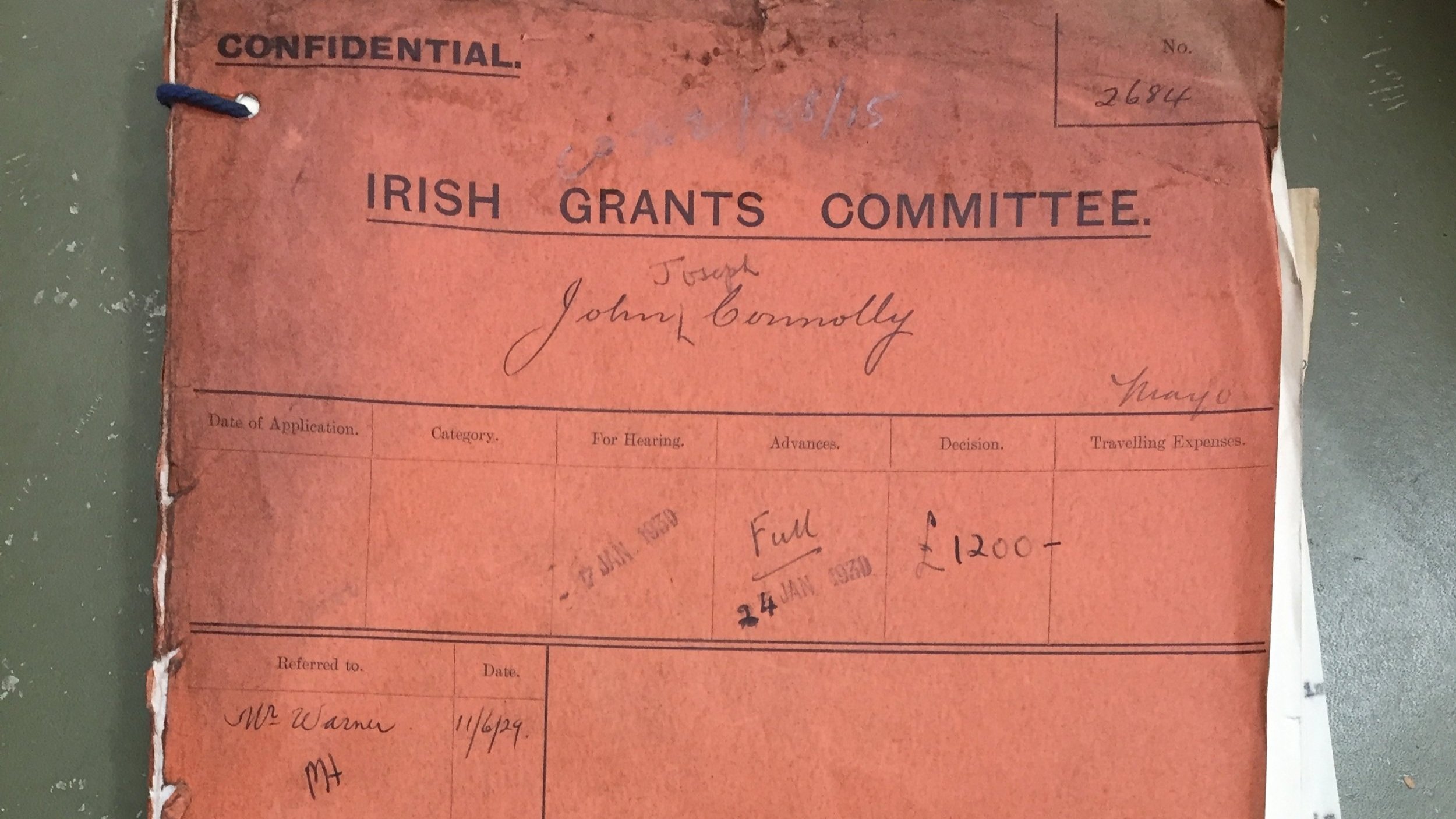
CO 762 - Irish Distress & Irish Grants Committee Files and Minutes (1922-1937)
The County Mayo and Sligo Files
Loyalist Compensation Claims
References:
[1] Hansard, HL Deb 3 July 1922, Vol. 51 cc 196-202.
[2] Taylor, Paul, Heroes or traitors?: experiences of southern Irish soldiers returning from the Great War, 1919-39 (Reappraisals in Irish history, Liverpool, 2015) pp. 128-30; The National Archives’ Website: Discovery: Irish Distress Committee and Irish Grants Committee: Files and Minutes, Description available at https://discovery.nationalarchives.gov.uk/details/r/C4951 (accessed 9 May 2024).
In the aftermath of the years of conflict in Ireland during 1918-1923, with the War of Independence of Irish Republicans against the British state and the subsequent Irish Civil War among nationalists over the Anglo-Irish Treaty terms, many individuals found themselves facing injuries and financial losses attributed to the activities of the IRA, citing their allegiance to the British Crown. Ex-servicemen, having served voluntarily in the war, argued that their dedication to the Crown warranted consideration alongside other loyalists.
A concerted effort was undertaken by loyalist organisations, backed by influential politicians, to press for recognition and compensation for these victims. Media coverage often sympathetically highlighted perceived atrocities, amplifying the call for justice.
In a pivotal House of Lords debate in July 1922, Lord Carson emphasized the "outrages" suffered by those loyal to Britain, who were left vulnerable due to a lack of protection. This led to mounting pressure on the British Government to intervene on behalf of loyalists, resulting in the establishment of a comprehensive compensation system.
The Anglo-Irish Treaty of the time acknowledged the need for "fair compensation" for injuries inflicted during the conflict. Consequently, the Compensation (Ireland) Commission was jointly established by the British and Irish Free State Governments in 1922. Chaired initially by Lord Shaw of Dunfermline and later by Sir Alexander Wood-Renton, the Commission addressed 41,000 claims, amounting to approximately £7 million in compensation, but critically the Commission's terms of reference were confined to the consideration of claims in respect of damage or injury incurred between 21 January 1919 and 11 July 1921 (the Irish War of Independence). The expenses were divided between the two governments, with each responsible for compensating their respective supporters. Costs were shared in cases where the injured individual was deemed neutral in the Anglo-Irish conflict.
Irish Grants Committee (IGC)
The formation of the Irish Grants Committee (IGC) in October 1926 expanded the scope of compensation to British subjects affected by the Irish Civil War. Formed in October 1926, the newly formed IGC was tasked with reviewing claims from British individuals who resided or conducted business in the Irish Free State. These claims were based on their support for His Majesty's Government before July 11, 1921, and the subsequent hardships endured between July 11, 1921, and May 12, 1923. The committee assessed compensation for various losses, including personal injuries, property damage, and other forms of harm such as expulsion, boycott-related losses, and fines imposed by the anti-Treaty IRA.
The IGC handled a total of 4,032 claims (originally 3,036, with an extended time limit for applications), with 895 deemed beyond the committee's scope, often due to incidents predating the Truce. Of these, compensation was refused in 900 cases while recommended in 2,237 cases, resulting in grants totaling nearly £2.2 million.
The committee regarded service in the Great War as indicative of loyalty, although relatively few ex-servicemen sought compensation. The IGC convened until February 11, 1930, when its chairman, Wood-Renton, submitted its report to the Secretary of State for the Dominions. While certain claims lingered until 1933, attempts to reconvene the Committee were unsuccessful. An effort by the Irish Loyalist Association in May 1931 to establish a new committee for those who hadn't submitted claims was met with skepticism by the Dominions Office, questioning their credibility and practices. Consequently, the government concluded that its obligations had been met and declined to initiate another inquiry. The files relating to the operations of these committees are now held in The National Archives at Kew, London. [2]
© Dr Liam A. Heffron, 10 May 2024.
“I cannot but think that, even at the present time, it is the duty of the great British Government to try to do something I to alleviate the utter want of protection […] being given to these people as to what is to be their fate in the future. You may have victory by the Free Staters, or you may have victory by the Republicans, whatever may be the difference between the two classes, but, believe me, the one set of people who are absolute helpless, and all the more undeservedly helpless because they are not interfering in the quarrels of these two classes, are those who have been loyal to this country.”
Lord Edward Carson, House of Lords Debate, ‘OUTRAGE IN IRELAND’, 3 July 1922 (1)
